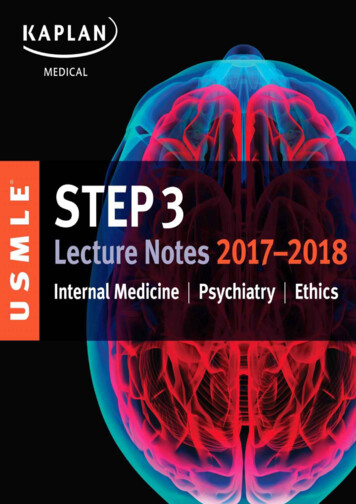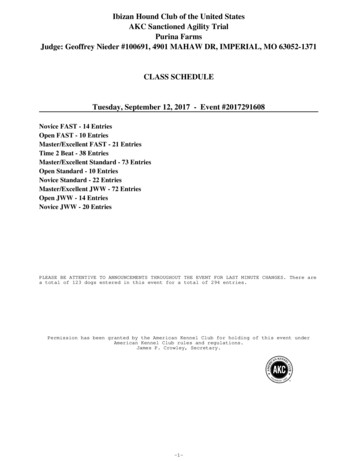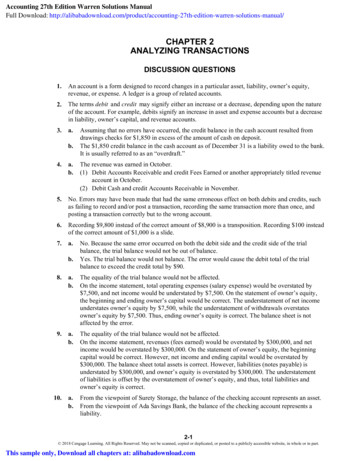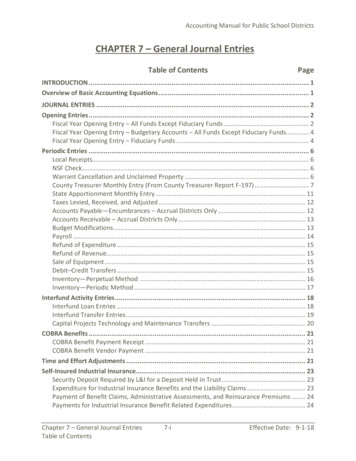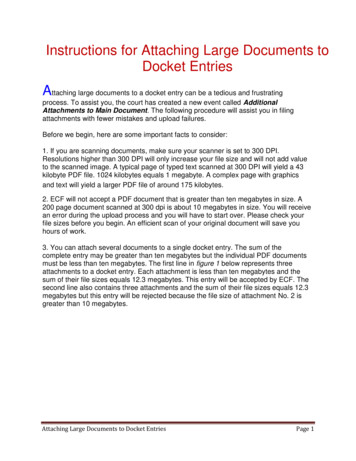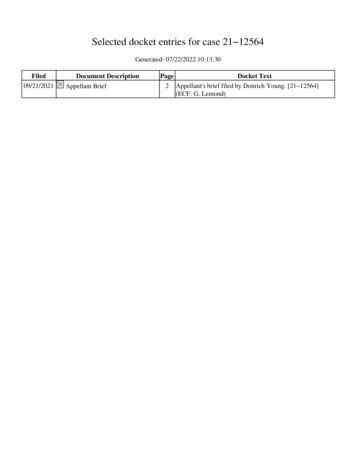
Transcription
Selected docket entries for case 21 12564Generated: 07/22/2022 10:13:30Filed09/21/2021Document DescriptionAppellant BriefPageDocket Text2 Appellant's brief filed by Donrich Young. [21 12564](ECF: G. Lemond)
USCA11 Case: 21-12564Date Filed: 09/21/2021Page: 1 of 47ELEVENTH CIRCUIT DOCKET NO. 21-12564-CCIN THE UNITED STATES COURT OF APPEALSFOR THE ELEVENTH CIRCUITDONRICH YOUNG,Plaintiff/Appellant,v.GRAND CANYON UNIVERSITY, INC. andGRAND CANYON EDUCATION, INC.,Defendants/Appellees.APPEAL FROM THE UNITED STATES DISTRICT COURT FORTHE NORTHERN DISTRICT OF GEORGIA, ATLANTA DIVISIONTHE HONORABLE TIMOTHY C. BATTENBRIEF OF APPELLANTE. Adam WebbGeorgia Bar No. 743910G. Franklin Lemond, Jr.Georgia Bar No. 141315WEBB, KLASE & LEMOND, LLC1900 The Exchange, S.E.Suite 480Atlanta, Georgia 30339(770) 444-9325(770) 217-9950 (facsimile)Counsel for Appellant
USCA11 Case: 21-12564Date Filed: 09/21/2021Page: 2 of 4711th Circuit Docket Number 21-12564-CCCERTIFICATE OF INTERESTED PERSONSAND CORPORATE DISCLOSURE STATEMENTPursuant to Federal Rule of Appellate Procedure 26.1 and Eleventh CircuitRule 26.1-1, Appellant hereby certifies that the following is a complete list of thetrial judge(s), all attorneys, persons, associations of persons, firms, partnerships, orcorporations that have an interest in the outcome of the particular case on appeal,including subsidiaries, conglomerates, affiliates, and parent corporations, includingany publicly held corporation that owns 10% or more of the party’s stock, andother identifiable legal entities related to a party:Alston & Bird, LLP, Counsel for AppelleesAmigos de Torrejon, LLC, Subsidiary of Grand Canyon Education, Inc.Batten, Sr., Timothy C., United States District Court JudgeCasa de Amistad, LLC, Subsidiary of Grand Canyon Education, Inc.Dickerson, Derin B., Counsel for AppelleesEl Vecino de Amigos, LLC, Subsidiary of Grand Canyon Education, Inc.GC Education, Inc., Subsidiary of Grand Canyon Education, Inc.Grand Canyon Education, Inc. (LOPE), AppelleeGrand Canyon University, Inc., AppelleeLa Fuente de la Comunidad, LLC, Subsidiary of Grand Canyon Education, Inc.i
USCA11 Case: 21-12564Date Filed: 09/21/2021Page: 3 of 47La Sonrisa de Siena, LLC, Subsidiary of Grand Canyon Education, Inc.Lemond, Jr., G. Franklin, Counsel for AppellantMid-State Rental Properties, LLC, Subsidiary of Grand Canyon Education, Inc.Nueva Ventura, LLC, Subsidiary of Grand Canyon Education, Inc.Nuevo Comienzo, LLC, Subsidiary of Grand Canyon Education, Inc.Orbis Education Services, LLC, Subsidiary of Grand Canyon Education, Inc.Orbis Education Management Company, LLC, Subsidiary of Grand CanyonEducation, Inc.Orbis Education II, LLC, Subsidiary of Grand Canyon Education, Inc.Piedras Bonitas Inversiones, LLC, Subsidiary of Grand Canyon Education, Inc.Ramsay, Kristi, Counsel for AppelleesREG 5160, LLC, Subsidiary of Grand Canyon Education, Inc.Rentwise Properties, LLC, Subsidiary of Grand Canyon Education, Inc.Strumph, Caroline Rawls, Counsel for AppelleesTierra Vista Inversiones, LLC, Subsidiary of Grand Canyon Education, Inc.Webb, Edward Adam, Counsel for AppellantWebb, Klase & Lemond, LLC, Counsel for AppellantYoung, Donrich, Appellantii
USCA11 Case: 21-12564Date Filed: 09/21/2021Page: 4 of 47DATED this 21st day of September, 2021.Respectfully submitted,BY: /s/ G. Franklin Lemond, Jr.E. Adam WebbGeorgia Bar No. 743910G. Franklin Lemond, Jr.Georgia Bar No. 141315WEBB, KLASE & LEMOND, LLC1900 The Exchange, S.E.Suite 480Atlanta, Georgia 30339(770) 444-9325Attorneys for Appellantiii
USCA11 Case: 21-12564Date Filed: 09/21/2021Page: 5 of 47STATEMENT REGARDING ORAL ARGUMENTPlaintiff-Appellant requests oral argument pursuant to Federal Rule ofAppellate Procedure 34(a) and Eleventh Circuit Rule 34-3(c). Oral argument willassist the Court in considering the important issues raised herein, which affect tensof thousands of students of Grand Canyon University and tens of millions offederal student loan dollars.iv
USCA11 Case: 21-12564Date Filed: 09/21/2021Page: 6 of 47TABLE OF CONTENTSCERTIFICATE OF INTERESTED PERSONS.iSTATEMENT REGARDING ORAL ARGUMENT . ivTABLE OF CONTENTS .vTABLE OF CITATIONS. viiSTATEMENT OF JURISDICTION .xSTATEMENT OF THE ISSUES .1STATEMENT OF THE CASE.2Procedural History .3Statement of Facts.6STANDARD OF REVIEW .13SUMMARY OF THE ARGUMENT .14ARGUMENT .15I.Mr. Young Stated A Valid Breach Of Contract Claim .15II.Mr. Young Stated A Valid Claim For Relief Under TheCovenant Of Good Faith And Fair Dealing .19III.Mr. Young Stated Valid Claims For IntentionalMisrepresentation And Violation Of The ArizonaConsumer Fraud Act.22IV.A.The Heightened Pleading Standard Does NotApply .22B.Actionable Conduct Has Been Alleged .23Mr. Young Stated A Viable Claim For Unjust Enrichment .25v
USCA11 Case: 21-12564V.Date Filed: 09/21/2021Page: 7 of 47The District Court Erred In Finding Defendants’ MotionTo Dismiss Was Aimed At Mr. Young’s Claims, WhenDefendants Explicitly Stated It Was Not .29CONCLUSION .33vi
USCA11 Case: 21-12564Date Filed: 09/21/2021Page: 8 of 47TABLE OF AUTHORITIESAbels v. JPMorgan Chase Bank, N.A.,2009 WL 5342768 (S.D. Fla. 2009) .27American Casual Dining, LP v. Moe’s SW Grill, LLC,426 F. Supp. 2d 1356 (N.D. Ga. 2006) .28Cheatham v. ADT Corp.,161 F. Supp. 3d 815 (D. Ariz. 2016) .25Clark v. Aaron’s, Inc.,914 F. Supp. 2d 1301 (N.D. Ga. 2012) .28, 29Cleveland v. Policy Mgmt. Sys. Corp.,526 U.S. 795 (1999) .26, 27Cole v. U.S. Att’y Gen.,712 F.3d 517 (11th Cir. 2013) .32Corey Airport Servs., Inc. v. City of Atlanta,181 F. App’x 908 (11th Cir. 2006) .19Dougherty v. City of Covina,654 F.3d 892 (9th Cir. 2011) .19Edwards v. Prime, Inc.,602 F.3d 1276 (11th Cir. 2010) .xFed. Nat’l Mortg. Ass’n v. Prowant,209 F. Supp. 3d 1295 (N.D. Ga. 2016) .31Glover v. Liggett Group, Inc.,459 F.3d 1304 (11th Cir. 2006) .13Great W. Bank v. LJC Dev., LLC,362 P.3d 1037 (Ariz. Ct. App. 2015) .20vii
USCA11 Case: 21-12564Date Filed: 09/21/2021Page: 9 of 47Henderson v. McMurray,987 F.3d 997 (11th Cir. 2021) .32In re Equifax, Inc., Customer Data Sec. Breach Litig.,362 F. Supp. 3d 1295 (N.D. Ga. 2019) .22, 23In re Facebook, Inc. Internet Tracking Litig.,956 F.3d 589 (9th Cir. 2020) .19Lee v. City of Los Angeles,250 F.3d 668 (9th Cir. 2001) .18Lombard’s, Inc. v. Prince Mfg., Inc.,753 F.2d 974 (11th Cir. 1985) .18Manicini Enters., Inc. v. American Express Co.,236 F.R.D. 695 (S.D. Fla. 2006) .28Novoneuron Inc. v. Addiction Research Inst., Inc.,326 F. App’x 505 (11th Cir. 2009) .13Pierre-Canel v. American Airlines,375 F. Supp. 3d 1044 (D. Ariz. 2019) .15Raup v. Wells Fargo Bank, NA,2013 WL 3216175 (D. Ariz. June 25, 2013) .24Sapuppo v. Allstate Floridian Ins. Co.,739 F.3d 678 (11th Cir. 2014) .31Smith v. Serv. Oil Co. v. Parker,549 S.E.2d 485 (Ga. Ct. App. 2001) .28Sierra-Sonora Enterprises, Inc. v. Domino’s Pizza, LLC,2010 WL 1780998 (D. Ariz. May 4, 2010) .18Singh v. U.S. Att’y Gen.,561 F.3d 1275 (11th Cir. 2009) .32viii
USCA11 Case: 21-12564Date Filed: 09/21/2021Page: 10 of 47S. Coal Corp. v. Drummond Coal Sales, Inc.,2017 WL 7550765 (N.D. Ga. Nov. 15, 2017) .27Texas Ed Tech Sols., LLC v. Authentica Sols., LLC,2020 WL 5774015 (N.D. Ga. Sept. 28, 2020) .26, 27Thomas v. Montelucia Villas, LLC,302 P.3d 617 (Ariz. 2013) .15Tidikis v. Network for Med. Commc’ns & Research, LLC,619 S.E.2d 481 (Ga. Ct. App. 2005) .28, 29Trusted Data Sols., LLC v. Kotchen & Low, LLP,2015 WL 11251959 (N.D. Ga. Feb. 6, 2015) .28Two Bros. Distrib. Inc. v. Valero Mktg. & Supply Co.,270 F. Supp. 3d 1112 (D. Ariz. 2017) .20Young v. Grand Canyon Univ., Inc.,980 F.3d 814 (11th Cir. 2020) .25, 26WESI, LLC v. Compass Envtl.,509 F. Supp. 2d 1353 (N.D. Ga. 2007).27ix
USCA11 Case: 21-12564Date Filed: 09/21/2021Page: 11 of 47STATEMENT OF JURISDICTIONThis appeal arises from a July 22, 2021 ruling from the Northern District ofGeorgia granting Defendants-Appellees’ Motion to Dismiss in its entirety. Thedistrict court’s order is a “final decision,” giving this Court jurisdiction over theappeal. 28 U.S.C. § 1291; also Edwards v. Prime, Inc., 602 F.3d 1276, 1288 (11thCir. 2010) (“An appeal from a final judgment of the district court, one disposing ofall the claims and defenses of all the parties in a lawsuit, poses no jurisdictionalproblem”).x
USCA11 Case: 21-12564Date Filed: 09/21/2021Page: 12 of 47STATEMENT OF ISSUES1.Whether the district court erred in finding Plaintiff failed to state aclaim for breach of contract by subjecting this claim to a heightened pleadingstandard and by failing to construe all allegations in favor of Mr. Young.2.Whether the district court erred in finding Plaintiff failed to state aclaim for breach of the implied covenant of good faith and fair dealing despite Mr.Young’s detailed allegations that Defendants did not exercise their contractualdiscretion in good faith.3.Whether the district court erred in finding Plaintiff failed to state aclaim for unjust enrichment despite the fact that Mr. Young explicitly pled thisclaim in the alternative.4.Whether the district court erred in finding Plaintiff failed to state aclaim under the Arizona Consumer Fraud Act even though Defendants’ formcontracts contained inaccurate information regarding the length of time it takes tocomplete its doctoral programs.5.Whether the district court erred in finding Defendants’ Motion toDismiss was aimed at Mr. Young’s claims, when Defendants’ motion explicitlystated that it was not.1
USCA11 Case: 21-12564Date Filed: 09/21/2021Page: 13 of 47STATEMENT OF THE CASEThis is the second time this case has been before this Court. During the firstappeal, this Court reversed the district court’s order granting Defendants’ motion tocompel arbitration, holding that 34 C.F.R. § 685.300(f) prohibited Defendants fromenforcing their pre-dispute arbitration agreement with respect to Mr. Young’sclaims. See Young v. Grand Canyon Univ., Inc., 980 F.3d 814, 821 (11th Cir.2020).As explained in greater detail herein, even though Defendants neveractually moved to dismiss Mr. Young’s claims, on remand the district court grantedDefendants’ purported Motion to Dismiss and entered judgment in favor ofDefendants. Reversal is necessary once again.Grand Canyon University, Inc. and Grand Canyon Education, Inc.(collectively, “GCU”) have adopted a scheme to unfairly increase profits at theexpense of students and the federal government. The student victims of thisscheme must pay, or take out loans to pay, for courses that have no value becauseGCU does not honor its commitment as to when a doctorate can be completed.GCU represents to its doctoral students that a doctorate can be obtained aftercompleting 60 credit hours. This representation is demonstrably false.Plaintiff fulfilled his contractual obligations but GCU has not.GCU’sDissertation Milestone Table confirms that the promised 60-credit hour program is2
USCA11 Case: 21-12564Date Filed: 09/21/2021Page: 14 of 47not attainable. This results in students being enrolled for far longer than should benecessary to complete their degree and enables GCU to improperly line its pocketsthrough tuition payments made via federal student loans. Finishing a doctoratewithin 60 credit hours is unattainable for the several reasons described in theAmended Complaint. In fact, GCU has designed its dissertation program andrequirements so that students cannot complete the program within 60 hours and –after they are trapped in GCU’s program – must pay for numerous extra courses.Beyond GCU’s promises regarding the completion of the doctoral programwithin 60 credit hours, Defendants promise to provide doctoral students the“individualized support” needed to timely complete a dissertation. GCU alsopromises that a doctoral student’s dissertation chair and committee members will“work directly” with doctoral candidates. This does not occur.Procedural HistoryThis case was originally filed on March 7, 2019. See Doc. 1. Followingremoval, Defendants filed a Motion to Dismiss (Doc. 6) and a Motion to CompelArbitration (Doc. 7).Defendant’s Motion to Dismiss indicated that it was“specifically directed at the claims asserted by Plaintiff Kolb and Jane Does I,II, and III” and that GCU was independently moving to compel arbitration as tothe plaintiffs governed by an arbitration agreement.3See Doc. 6-1, p. 4 n.5
USCA11 Case: 21-12564Date Filed: 09/21/2021Page: 15 of 47(emphasis added). In response, the Plaintiffs filed an Amended Complaint (Doc.10) which added Mr. Young as a Plaintiff. Defendants moved to dismiss theAmended Complaint (Doc. 13) and filed a second Motion to Compel Arbitration(Doc. 14). In their second motion, Defendants again indicated that the motion wasdirected at the claims asserted by Plaintiff Kolb and Jane Does I,II, and III. Plaintiffs Carr, Stanton, and Young are required tosubmit their claims to arbitration, pursuant to their signedenrollment agreements. Accordingly, Defendants filed a Motion toCompel Arbitration as to Plaintiffs Carr, Stanton, and Young.See Doc. 13-1, p. 4 n.5 (emphasis added). Defendants further told the district courtthat, because Mr. Young was required to submit his claims to arbitration, pursuantto a signed enrollment agreement, that they “filed a Motion to Compel Arbitration”as to Mr. Young’s claims. Id. 1 Mr. Young opposed arbitration (Doc. 17) andPlaintiffs opposed dismissal (Doc. 19). Defendants filed replies. See Doc. 21-22.On August 19, 2019, the district court granted dismissal on the basis that thecourt lacked jurisdiction over the claims of all Plaintiffs except Mr. Young. SeeDoc. 24.With respect to Mr. Young, the court compelled arbitration anddismissed the case. Id. Mr. Young timely appealed. See Doc. 26. This Courtreversed, holding that Defendants were barred from seeking arbitration of Mr.1Defendants filed an updated arbitration motion, which informed the district courtthat it was “amended to reflect that newly added Plaintiff Donrich Young must alsoarbitrate his claims.” See Doc. 14-1, p. 1, n.1.4
USCA11 Case: 21-12564Date Filed: 09/21/2021Page: 16 of 47Young’s claims. See Young v. Grand Canyon Univ., Inc., 980 F.3d 814, 821 (11thCir. 2020); Doc. 30.Following remand, the district court adopted the opinion of this Court as itsjudgment regarding the arbitration issue. See Doc. 33. A month later, afterDefendants failed to answer Mr. Young’s claims, Plaintiff filed a Motion forClerk’s Entry of Default.See Doc. 34.Defendants opposed (Doc. 35) andPlaintiff filed a reply (Doc. 36). On January 21, 2021, the district court deniedPlaintiff’s request for entry of default, finding that, despite the fact thatDefendants’ request for dismissal was not directed towards Mr. Young’s claims,the court would interpret Defendants’ motion as if it were. See Doc. 37.2On May 26, 2021, the district court entered an order directing Mr. Young toupdate the Court within 14 days on whether any of his claims were moot based onthis Court’s ruling. See Doc. 40. Plaintiff complied (Doc. 41) and Defendantsfiled a response (Doc. 42).On July 22, 2021, the district court grantedDefendants’ Motion to Dismiss and entered judgment in favor of Defendants. SeeDoc. 43, 44. Mr. Young timely appealed. See Doc. 45.2Even though Mr. Young disputes that Defendants actually moved to dismiss hisclaims, and challenges this determination herein, for the purposes of this brief, Mr.Young presents his arguments as if GCU indeed moved to dismiss his claims. Bydoing so, Mr. Young does not waive his challenge the district court’s determinationon the default issue raised herein.5
USCA11 Case: 21-12564Date Filed: 09/21/2021Page: 17 of 47Statement of FactsA.GCU and Its Doctoral Degree Programs.GCU is a rapidly growing for-profit college. See Amended Complaint, ¶ 14(Doc. 10). According to Defendants’ financial reporting to the Securities andExchange Commission:Our enrollment at December 31, 2017 was approximately 90,300,representing an increase of approximately 10.2% over our enrollmentat December 31, 2016. Our net revenue and operating income for theyear ended December 31, 2017 were 974.1 million and 282.8million, respectively, representing increases of 11.5% and 19.2%,respectively, over the year ended December 31, 2016. Our netrevenue and operating income for the year ended December 31, 2016were 873.3 million and 237.2 million, respectively, representingincreases of 12.2% and 12.8%, respectively, over the year endedDecember 31, 2015.Id. The school has continued to expand rapidly, now enrolling over 111,000students. See 2020 Grand Canyon Education 10-K, p. 5. 3 Nearly 80% of GCU’sstudents are online students and 86% of the online students are age 25 or older.See Doc. 10, ¶ 15.The most important part of GCU’s operations is its highly efficient system ofpushing students to apply for federal student loans and grants. Id. at ¶ 16. Over71% of GCU’s funding comes from the federal government:3Available at: 9f-4236-8375e77a33807bbb.6
USCA11 Case: 21-12564Date Filed: 09/21/2021Page: 18 of 47During fiscal 2017 and 2016, we derived approximately 71.5% and72.3%, respectively, of our net revenues (calculated on a cash basis inaccordance with Department of Education standards currently ineffect) from tuition financed under the Title IV programs. Theprimary Title IV programs that our students receive funding from arethe Federal Direct Loan program or FDL Program, and the FederalPell Grant, or Pell, Program.Id. Much of this funding is for graduate programs: “79.1% of our students wereenrolled in our online programs, and, of our working adult students (online andprofessional studies students), 50.5% were pursuing master’s or doctoral degrees.”Id. at ¶ 18. Thus, millions of dollars in annual profits flow to GCU from thefederal student loans of doctoral students like Mr. Young. Id. at ¶ 10. Undoubtedlya substantial portion of the market capitalization of Grand Canyon (some 5,600,000,000 at the time of the Amended Complaint) can be attributed to theprofitability of GCU’s online graduate programs. Id.GCU represents that its doctoral programs can be completed after studentstake 60 credit hours of coursework. Id. at ¶ 19. These 60 credit hours includethree dissertation courses worth three credit hours each. Id. GCU’s representationthat its doctoral programs can be completed in 60 credit hours is false. Id. Inreality, only a tiny percentage of students ever complete a doctorate at GCU andthose who do are forced to pay for far more than 60 hours of coursework.GCU makes students pay for additional courses in order to keep movingtoward their degree. These dissertation courses are not actual academic classes,7
USCA11 Case: 21-12564Date Filed: 09/21/2021Page: 19 of 47but purport to provide individualized academic support by their dissertation chairand committee members. Id. at ¶ 20. When students do not complete theirdissertation by the end of their first three dissertation courses, GCU requiresstudents to take what are referred to as “research continuation” courses. Id. at ¶ 21.Research continuation courses are purportedly the vehicle to providestudents with continuing individualized support for completing their “dissertationjourney.” Id. at ¶ 22. According to the GCU course catalog, research continuationcourses are essentially the same thing as dissertation courses because they allowstudents “to work directly with their dissertation chair and committee membersbased on their individual progress plan for completing their dissertation.” Id.GCU students receive three credit hours for the first five research continuationcourses that they take while working on their dissertation. Id. at ¶ 23.These credit hours, however, are worthless because a doctoral student hasalready completed the 60 credit hours purportedly needed to complete thedoctorate before they are enrolled in any research continuation courses. Id. at ¶ 24.Doctoral students are charged 650 for each credit hour, for a total of 1,950 perresearch continuation course. Id. at ¶ 25.Thus, a student taking all of these first five continuation courses will havereceived 15 additional – and completely unnecessary – course credits and paidGCU – either directly or through more student loan debt – an additional 9,750 in8
USCA11 Case: 21-12564Date Filed: 09/21/2021Page: 20 of 47tuition payments. Id. at ¶ 26. If a student has not completed his or her dissertationwithin 75 credit hours, they are enrolled in “dissertation research continuationcourses.” These courses provide no credit hours and are supposedly designed to“emphasize the finalization of the dissertation” – the same purpose given for thefirst five “research continuation courses.” Id. at ¶ 27.To illustrate how GCU misrepresents its doctoral program, consider astudent enrolling in GCU’s “Doctor of Business Administration with an Emphasisin Data Analytics” program. GCU’s Academic Catalog lists a variety of coursesnecessary to graduate and then totals the credits earned for each listed course (3hours each) and shows a total of 60 credit hours required for completion. Id. at ¶29. A closer review of GCU’s doctoral program requirements shows that it isimpossible to complete the program within only 60 credit hours. Id. at ¶ 31.GCU’s “Dissertation Milestone Table,” attached as “Appendix A” to its“University Policy Handbook” (a 185-page document separate and apart from its413-page Academic Catalog), shows that GCU requires eight “review levels”leading to “final approval” and publication of a dissertation. Id. An examinationof the “Dissertation Milestone Table” reveals that GCU in fact requires that itsDoctor of Business Administration candidates complete, at a minimum, one“research continuation” course just to reach level four (of eight) of the dissertationreview process. In order to reach dissertation review level eight, required for9
USCA11 Case: 21-12564Date Filed: 09/21/2021Page: 21 of 47publication and graduation, the student must, at a minimum, have completed allfive of the “research continuation” courses. Id. at ¶ 32.Thus, any and all of GCU’s representations that a student could possiblycomplete a doctorate after 60 credit hours are materially false. This is a materialmisrepresentation because, among other reasons, there are many other schoolsoffering doctoral degrees that could actually be earned in 60 credit hours. GCU’smisrepresentations and omissions make it impossible for a prospective student toestimate the time and cost of earning a degree at GCU. Id. at ¶ 33.Additionally, using GCU’s online “net price calculator” also misrepresentsthat students can complete a doctorate after 60 credit hours. Id. at ¶ 34. Thisonline tool promises to show students exactly what their degrees will cost. Id. It isa critical piece of GCU’s marketing machinery. Id. It has been programmed toprovide false information to potential doctoral degree candidates. Id.By the time a student figures out GCU’s bait-and-switch scheme, it is far toolate. After borrowing tens of thousands of dollars for years of coursework andstarting on their “dissertation journey,” GCU is well aware most students will notleave the program even though they realize they have been duped. Id. at ¶ 35. Anyand all credits earned as a part of GCU’s “dissertation journey” are expressly nontransferable to another degree program. Therefore, even if students did want to10
USCA11 Case: 21-12564Date Filed: 09/21/2021Page: 22 of 47leave after they realize they were fooled, they cannot do so because their work andmoney will have been wasted. Id. at ¶ 36.All of GCU’s doctoral programs requiring dissertations are set up this way.Id. at ¶ 37. GCU intentionally misrepresents the actual minimum number of coursehours required to earn a doctoral degree – and the tuition expense of doing so – sothat students will enroll at GCU. Id.GCU’s Academic Catalog promises doctoral students that “the College ofDoctoral Studies will be the premier provider of online doctoral education.” Id. at¶ 47. It further promises doctoral students that the school will “leverage theknowledge and expertise of faculty, learners, and experts external to the Universitythrough learning communities specific to the issues, concepts, and methods of agiven discipline.” Id. at ¶ 48. GCU is not, however, a “premier provider of onlinedoctoral education” that “leverage[s] the knowledge and expertise of faculty” in afashion that benefits students. Rather, GCU provides its doctoral students withsubstandard instruction and guidance and an insufficient level of resources tocomplete dissertations on a timely basis. Id. at ¶ 49. GCU has also establishedmandatory benchmarks and milestones that cannot be achieved within thepromised 60-hour format of its doctoral programs. It is literally impossible fordoctoral students to complete their dissertation – and therefore their degree –within the time represented by GCU. Id. at ¶ 50.11
USCA11 Case: 21-12564B.Date Filed: 09/21/2021Page: 23 of 47Mr. Young’s Pursuit of a Doctorate.Mr. Young enrolled in a Doctor of Education degree from GCU in January2015. Id. at ¶ 68. He received Federal Direct Loans in order to pay for thedoctoral program. Id. at ¶ 69. Mr. Young was forced to pay for three continuationcourses. Despite his best efforts, the necessary guidance and resources were notmade available such that his dissertation could have been completed. Id. at ¶ 71.44Mr. Young subsequently suspended his pursuit of a doctorate from GCU. He hasnothing to show for his efforts, after spending hundreds of hours away from hisfamily and taking out tens of thousands of dollars of federal student loans.12
USCA11 Case: 21-12564Date Filed: 09/21/2021Page: 24 of 47STANDARD OF REVIEWThis Court reviews the grant of a motion to dismiss under Rule 12(b)(6) forfailure to state a claim de novo, accepting the allegations in the complaint as trueand construing them in the light most favorable to the plaintiff. Novoneuron Inc. v.Addiction Research Inst., Inc., 326 F. App’x 505, 506 (11th Cir. 2009); Glover v.Liggett Group, Inc., 459 F.3d 1304, 1308 (11th Cir. 2006).13
USCA11 Case: 21-12564Date Filed: 09/21/2021Page: 25 of 47SUMMARY OF ARGUMENTReversal is once again required to correct several errors made by the districtcourt. First, the district court dismissed Plaintiff’s breach of contract claim bysubjecting the claim to a heightened pleading standard and by failing to construeall allegations in favor of Mr. Young.Second, the district court incorrectlydismissed Mr. Young’s claim under the implied covenant of good faith and fairdealing because it ignored what was actually pled in the Amended Complaint. Thedistrict court also erred by finding that Mr. Young’s claims under the Ari
Grand Canyon University, Inc. and Grand Canyon Education, Inc. (collectively, "GCU") have adopted a scheme to unfairly increase profits at the . scheme must pay, or take out loans to pay, for courses that have no value because GCU does not honor its commitment as to when a doctorate can be completed. GCU represents to its doctoral .
